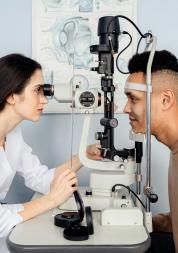Healthwatch report on people's experiences of using opticians

An estimated 50% of sight loss is avoidable. That's why it’s vital that people are able to have their eyesight tested regularly and, if there is a problem, get the help they need.
Yet our new research found the costs of additional eye care services, such as further tests or non-reflective lens coatings, are likely to stop some people from visiting opticians altogether.
Our research
We carried out a self-selecting online survey of people’s eye care experiences between July and September 2024, following concerns people shared with the patient champion about the cost of eye care.
In total, 2,568 people shared their stories about their eye care experiences, with 1,766 people responding to the questions about having eye tests in the last two years.
Key findings
- One in seven, 14%, of people who responded to our survey had avoided eye care due to cost in the last two years.
- Of those who had attended an eye test in the last two years, 72% had experienced staff offering additional services at a cost.
- Those who said that opticians had offered them additional paid-for services in the past were twice as likely to say they had avoided getting eye care in the last two years compared to those who had not experienced this (17% vs 8%).
- People who describe themselves as ‘not at all comfortable financially’ are much more likely to avoid going to opticians than those who are financially very comfortable (39% vs 3%)
- Most (84%) of the respondents to our survey were eligible for free eye tests.
Many people eligible for financial support for their eye care may find it difficult to afford additional costs. Concern about being pushed into paying for products or services they can’t afford may put them off going to the opticians.
Our recommendations
In our report, we set out steps to protect people from the impact of rising eye care costs:
- The Department of Health and Social Care should review support for the costs of NHS eye care for those on the lowest incomes.
- The Government and the NHS should consider a targeted communications campaign through direct channels to low-income eye care patients.
- The primary eye care sector should have clear guidelines for how staff should assist those on lower incomes without affecting their confidence in seeking care.
Downloads
If you need this report in a different format, please email enquiries@healthwatch.co.uk or call 030000 68 3000.


